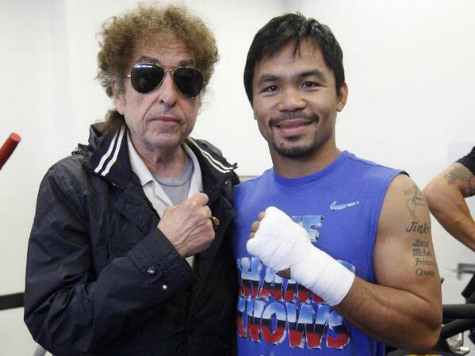
Manny Pacquiao sings when not boxing. Bob Dylan boxes when not singing. So when the pair’s paths crossed earlier this week, it was either destiny or a dream. Could there be two more dissimilar dudes with similar interests?
Bob Dylan dropped by Freddie Roach’s appropriately named Wild Card Boxing Club on Thursday. He watched Manny Pacquiao train for his next-month rematch with Timothy Bradley. The busker and the boxer cut as surreal a scene as “Visions of Johanna” conjures surreal a sound. When do we find out that Miley Cyrus and Wilfred Brimley hang out, too?
“Manny sparred eight different rounds with two different fighters while Dylan was there,” Pacquiao flunky Fred Sternburg told Rolling Stone, a magazine advertising Dylan’s cultural import by allowing him to appear, in his wordsmith way, on every cover. “He stayed for an hour and sat on a bench that you’d use to lift weights. Before and after the sparring, Dylan posed for photographs with anyone that asked and signed autographs. Some of the other fighters took selfies with him. He accommodated everybody and smiled the whole time. But, my God, it was Bob Dylan. It was like seeing one of the apostles.”
Maybe Dylan felt the same about meeting Manny. Surely a behind-the-fingers glimpse of Pacquiao’s knockout of Ricky Hatton works as a work of art much like an open-eared listen to Blood on the Tracks does. We can strain for similarities between the extraordinarily different extraordinary men. The two solo artists, for instance, play well with others–Erik Morales, Juan Manuel Marquez for Pacquiao; Joan Baez, The Band for Dylan. And both prove enigmatic–Pacquiao to foes, Dylan to fans. But these guys go together like mayonnaise on mint chocolate chip. Dylan’s output arrests listeners for its subtle, understated qualities; Pacquiao’s jars for its blunt explosiveness, its in-your-face tenacity. But just like the rest, the best can’t help but admire the best.
Nevertheless, as evidenced by the paucity of selfies and tweets shared by Dylan’s camp about the event, the gym’s attraction seemed more enthused by his spectator than the reverse. Even when sitting in the audience Bob Dylan stands on the stage. Pacquiao tweeted, “After BOB DYLAN watched me train today, @FreddieRoach said, ‘I think A Hard Rain’s a-Gonna Fall on @ TimBradleyJr.'” Bradley, in non sequitur fashion, responded: “@MannyPacquiao @Freddie Roach I will be ready for a hard rain. You better be ready for a Desert Storm!”
Couldn’t the undefeated welterweight–whose nickname, in his defense, is “Desert Storm”–have just played along with a lame joke about breaking Pac Man “just like a little girl” a la “Just Like a Woman”? Alas, Bradley, who entered the ring against Pacquiao the last time to “All I Do Is Win” by someone named DJ Khaled (featuring special guest rappers T-Pain, Ludacris, Snoop Dogg, and Rick Ross), evidently knows Bob as well as the rest of us know Mr. Khaled.
That’s too bad. There’s a Bob Dylan for everyone. Political Bob on “With God on Our Side.” Rocker Bob on “Like a Rolling Stone.” Country Bob on “Nashville Skyline Rag.” God Guy Bob on “Gotta Serve Somebody.” Bitter Bob on “Positively Fourth Street.” Sentimental Bob on “Forever Young.” Ethereal Bob on “Series of Dreams.” You can’t stay current for a half century by staying the same. Surely knock-out-artist-turned-boxer Manny Pacquiao, who started his career a less-than-hundred-pound teenager hiding rocks in his pockets to make minimum scale standards as a light flyweight, understands the need for change.
Martin Scorsese’s film “No Direction Home” captured Dylan as a chameleon who, in effect, couldn’t be captured. Perhaps he’s more accurately understood as a human Rorschach Test upon which everybody from the Weathermen to Chrysler to the Wild Card Boxing Club all project conflicting images. It’s not him. It’s us. The Beatles, Madonna, and Kiss changed their look. Bob Dylan hopped in and out of genres, voices, and moods. So it’s fitting that his perception of boxing has shifted, too.
Fifty years ago last month, The Beatles dropped in on Cassius Clay, before he went Robert Zimmerman and changed his name to Muhammad Ali, as he trained to fight Sonny Liston for the first time. But Dylan’s interest in boxing predated even that clash of wunderkinds in Miami. It surely didn’t start Thursday by meeting Manny Pacquiao or even in 1975 writing about Ruben “Hurricane” Carter.
Dylan penned in 1963 “Who Killed Davey Moore?” about a lineal forebear to Manny Pacquiao as featherweight champion. That year, Moore lost a championship bout with Sugar Ramos and then lost his life. The Hibbing, Minnesota-native noticed. Whereas Dylan utilizes boxing to keep in shape in senior citizenship, the twentysomething folk singer indicted those even peripherally involved in the sweet science with bloody murder in that topical song. Like so many Dylan compositions, there’s more than meets the ear. Is Davey Moore a stand-in for Christ here? He asks the referee, the fans, the gambler, a sports writer, and others: “Who killed Davey Moore?” All deny culpability. Everyone’s got blood on their hands.
But what-a-long-strange-trip-it’s-been later, in Hollywood’s Wild Card Boxing Club, the songwriter who played ventriloquist to the sports writer in “Who Killed Davey Moore?” appears to mouth back the words of his creation: “Fist fighting is here to stay/It’s just the old American way.” So is Bob Dylan.
Daniel J. Flynn, the author of Blue Collar Intellectuals (ISI Books, 2011) and other books, edits Breitbart Sports.

COMMENTS
Please let us know if you're having issues with commenting.